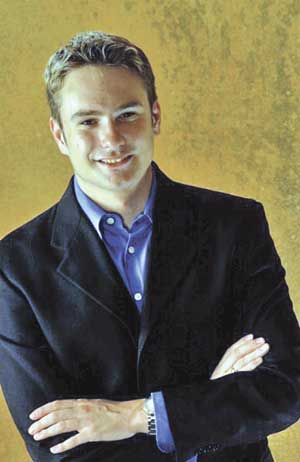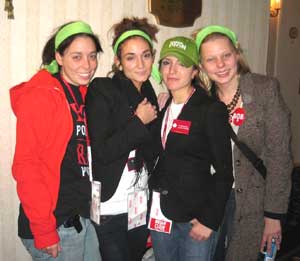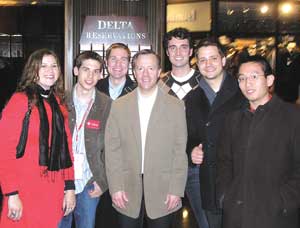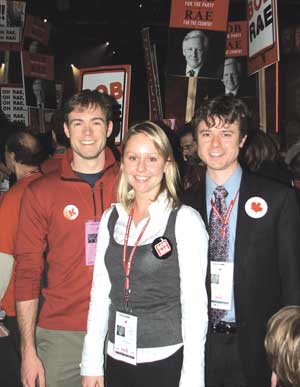
The Liberal leadership race was exciting and Law Times wanted to be there, but with a different twist. The editors got in touch with some law school delegates and got them involved by sharing some of their stories from the convention floor. We''ve collected the tales of a few Young Liberals here, with some great photos taken by the delegates.
Dion will be a strong leader
By Richard Diamond
 I went to Montreal supporting Scott Brison for the leadership of the Liberal Party.
I went to Montreal supporting Scott Brison for the leadership of the Liberal Party.
Brison represented the qualities I was looking for in a leader: a fresh face, a passionate advocate for the environment, social justice and economic prosperity, and the political skills to go toe-to-toe with Stephen Harper in the next election. As the youngest candidate in the race, Brison represented generational change for the party. Being the president of the Young Liberals of Canada, supporting him was an easy and obvious choice for me.
I had no illusions that Brison was going to win, but he injected this leadership campaign with energy and new innovative ideas that need to be promoted in our party if we want to beat the Conservatives in the next election. After Brison fell off the ballot, I moved with him and most of his team to support Bob Rae. Rae really impressed me throughout the campaign and for a long time was my second choice.
Rae addressed the convention without any notes at all and spoke from the heart. As more of the other leadership campaigns such as Joe Volpe and Ken Dryden came on board with Rae, I felt confident he had the momentum to win the day. The "Oh Rae, Oh Rae, Oh Rae" chants seemed to drown out all others.
Then in a move that changed the course of the convention, Gerard Kennedy withdrew and threw his weight behind Stéphane Dion. Dion, who originally was in fourth place after delegate selection weekend, had come in a surprise two votes ahead of Kennedy on the first ballot. Now things were totally unpredictable. Would Kennedy be able to deliver enough of his delegates to push Dion into second place and knock either Rae or Ignatieff off the ballot? In the end, Dion finished a strong first and it was Rae who was knocked off.
Rae addressed his team about the next step. In a gracious move that was indicative of the way he conducted himself throughout this race, he freed his delegates to support whomever they chose. No longer were the battle lines drawn between the two frontrunners. Rae's move of remaining personally neutral ensured that the eventual winner, Dion, would win with a unified party behind him. I cast my final ballot for Dion.
When Dion was announced the winner, the runner-up, Michael Ignatieff, gave the best speech I have ever heard him give. The former Harvard professor urged the crowd to rally behind Dion and called for "tous ensemble."
Dion, the improbable victor in this race won and the excitement and energy behind him is huge. I look forward to campaigning for him in the next election. He will be a strong leader for our party and a great Prime Minister for our country.
Richard Diamond is a second-year law student at the University of Western Ontario and is the outgoing president of the Young Liberals of Canada and incoming chairman of the standing committee on communications and publicity of the Liberal Party of Canada.
United behind the new leader
By Michelle Oliel
 Following the result of the third ballot, Bob Rae's campaign was faced with a very difficult decision. After learning about our unfortunate loss, myself along with four other key Rae organizers gathered in a corner outside the convention floor to discuss our next steps. While Rae himself honourably refused to declare his support for a candidate, our core group had a choice to make.
Following the result of the third ballot, Bob Rae's campaign was faced with a very difficult decision. After learning about our unfortunate loss, myself along with four other key Rae organizers gathered in a corner outside the convention floor to discuss our next steps. While Rae himself honourably refused to declare his support for a candidate, our core group had a choice to make.
The Rae team had a difficult decision – Michael Ignatieff or Stéphane Dion. For me, the answer after Rae was Dion. I just could not bring myself to lend support to Ignatieff, or as we Liberals affectionately call him, Iggy. Even though I did not know where the campaign stood, I called a member of Dion's senior staff to inform them that I could not sit idly by after Rae's unfortunate loss. I had worked too hard and come too far.
I was not alone in realizing the impact Rae's camp could have on the outcome of this leadership race. Not two minutes after the result, John Mraz, Rae's National Whip, turned to his central campaign team for guidance. Sitting quietly huddled in a dark corner of the hall of the Palais des Congrès, five key Rae whips and organizers gathered to make the decision that may have arguably won Dion the leadership.
As deputy national whip, I spoke first. With tears in my eyes, I looked to the team and stated that I would have to work against them if they decided to support Ignatieff. Mraz then proceeded to ask our national youth and women's organizers their thoughts. There was not a single argument. For our team, the answer was Dion after Rae. We quickly dropped off our Rae communications, as we were not working on his behalf any longer but rather on our own accord, and got straight to pulling votes for Dion.
While we may never truly know the extent of the impact that the Rae team had on Dion's victory, one thing is certain: the strategy for victory is unity. United we are today behind our new leader.
Michelle Oliel was a Bob Rae delegate who abstained on the first ballot. She is a third-year law student at the University of Windsor.
Enthusiasm for the party renewed
By Marty Venalainen
 I must begin with a confession. Over the course of the past few years, my faith in the Liberal Party of Canada has wavered. While recognizing it as the natural governing party, it was nonetheless hard to proselytize for a party at war with itself. The 2006 leadership convention, by bringing such feuds to an end, has renewed my enthusiasm for the party of Lester Pearson and Pierre Trudeau.
I must begin with a confession. Over the course of the past few years, my faith in the Liberal Party of Canada has wavered. While recognizing it as the natural governing party, it was nonetheless hard to proselytize for a party at war with itself. The 2006 leadership convention, by bringing such feuds to an end, has renewed my enthusiasm for the party of Lester Pearson and Pierre Trudeau.
Sure, there were rivalries at the convention, but they were of a more progressive and good-natured variety. The candidates fired missives, not at each other, but at the common enemy in the Conservative government. The convention was not only a marketplace of candidates' ideas but had many facets. At times, it resembled a televangelical church of believers. Substitute Hawaiian leis for silly scarves, and law firm swag for candidates' buttons, and at times it might have been frosh week at Osgoode. Yet above all else, Montreal's Palais des Congrès was transformed into a big tent, bringing together Liberals from coast to coast.
One personal highlight was the chance to meet Ontario Attorney General Michael Bryant (LLB '92, Osgoode), and former Osgoode professor and Minister of Justice Irwin Cutler. While they both serve as models for what a law student can one day hope to achieve, they nevertheless spoke with the camaraderie that can be expected of one Liberal meeting another.
Another highlight was, in the ground-war fashion common to such contests, debating "winnability" with supporters of various leadership candidates at an evening event permeated by stilt-walkers.
A proposal to replace the delegate-voting system with a "one member, one vote" system, which could have meant the end of conventions of this ilk, was narrowly defeated. If relying on a representative democracy is what it takes to bring members together to celebrate Liberalism and, even, what it means to be Canadian, then it was for the best. As Liberals united with Stéphane Dion at the helm, our time in the proverbial penalty box will be over very soon.
Marty Venalainen is an LLB candidate for 2008 at Osgoode Hall Law School and attended the convention as an observer.
A bumpy administrative road to Montreal
By Austin Acton
 My road to the Liberal Leadership Convention was not exactly smooth. Well, the drive was great, but the paperwork was bumpy.
My road to the Liberal Leadership Convention was not exactly smooth. Well, the drive was great, but the paperwork was bumpy.
Originally I had applied to be a regular delegate in the Toronto riding of St. Paul's. I paid my membership fees and waited for some confirmation to arrive by mail. I began receiving plenty of promotional material (and requests for donations to the party), but when delegate election time came around, it became clear that my name was not going to be on the ballot. Confused but complacent,
I decided to make my vote count even though my delegate application had mysteriously disappeared. I received two near-identical letters: one notifying me that I would be able to vote in St. Paul's, and the other for the riding of Ottawa West-Orleans. I have never lived in Orleans, and I haven't even driven through it in years. Suddenly the loss of my application form became less surprising.
Since the drive from Toronto to Orleans is about 4.5 hours, and the voting window was only five hours, I decided to vote in Toronto only. However, as a student at the University of Toronto, I expected to be able to vote a second time as part of the Liberal club there. On a night when I should have been doing many other things, I drove down to UofT to vote, only to be turned away, unapologetically, for not being under 25. I'm not sure how being 28 makes me any less of a student, but I had not been informed of this rule verbally or in writing.
After registering my vote for Bob Rae in St. Paul's, I received a surprising telephone call. The Liberal Aboriginal Peoples' Commission noticed that I had indicated Métis citizenship on my delegate application, and were asking if I would like to attend as an aboriginal delegate; no election required. Confused again, but delighted, I agreed.
I arrived in Montreal expecting the administrative mishaps to be over. For the most part they were, but there were constant reminders. Although they had been calling me for weeks, the registration desk had my phone number backwards. Also, a supervisor had to be called over every time I requested a voting card. Annoyed, I demanded to know why. The young woman shrank in her chair and blushed: "My computer crashes every time I let an Aboriginal delegate vote."
And in typical Liberal duplication of effort, each voting station had two staff members: one to enter my badge number and give me my ballot, and the other to (get this!) read my badge number to the first. Of course they read it incorrectly, or were misheard, almost every time.
The conference, for such a gargantuan effort, went off quite well. With thousands of delegates having paid $995 each to attend, maybe the Liberal party contracted out the conference organizers. It's the only explanation.
Austin Acton was a Bob Rae Aboriginal delegate who is in his second year of law school at the University of Toronto.
A bazaar-like atmosphere
By Pia Hundal
I arrived at the convention in Montreal Thursday afternoon and the Palais des Congrès was a sea of red: red carpets, red shirts, red scarves, and any other red paraphernalia you can think of. It was exciting and felt more like an Indian bazaar than a leadership convention, where peddlers of all sorts attempted to get their respective merchandise in your hands. Whether they be pins, stick-on tattoos, party invitations, platform booklets or Ignatieff chocolate bars, the merchandise was what the candidate had to sell and it was more than any one person could hold.
Although the bazaar-like atmosphere did not diminish the next day, the delegates were much more clearly differentiated by the varying red paraphernalia and signs. I doubt my feet will ever recover from the lines, placard carrying, and chatting with other delegates, but it was worth it to support Bob Rae. The energy was palpable and after each side's delegates cheered themselves hoarse, the speeches began.
Between standing in line to vote and helping the organizers in any way possible, it was impossible to be present and hear all of the speeches. However, for Rae's speech, we were a sea of red in the "supporter's pit". Feet away from former prime ministers, cameras all around, all eyes were on Rae as he delivered his speech with his unique combination of honesty and charisma.
The next day all the delegates felt a little worse for wear, but full of hope and anticipation. After the announcement of the previous day's vote, we were voting every hour and a half until the late afternoon. It was a day fuelled by adrenaline and energy drinks (which were necessary, since most of us didn't have the time or patience to wait in line for food). The highlight of the day for me was shaking hands with retired General Roméo Dallaire.
The end result was disappointing and we feel that Rae presented an opportunity to bring greatness to the party and the country. My only negative experience was about five seconds after the announcement that Rae would not be on the final ballot.
I was swarmed by other candidates' delegates trying to persuade me to join their side. People with tears in their eyes were being tapped on the shoulder without even a minute to compose themselves. We felt harangued and descended upon, so immediately after the shock of losing. It was as though this were a game and the delegates were merely players.
Despite this, the convention was an amazing experience. Throughout the conference, I felt very patriotic. We were all participating in and propagating the democratic system. The discourse that came out of the event was both interesting and thoughtful and reminded me why I'm lucky to be Canadian.
The Liberals today, while supporting different candidates, are of one mind as to what issues and concerns are important. The unity surrounding these goals overshadows the differences as to who would have been the best person to implement them. We all feel privileged and proud to have been part of such a once-in-a-lifetime experience.
Pia Hundal is an LLB candidate for 2008 at Osgoode Hall Law School and attended the convention as a Bob Rae delegate.